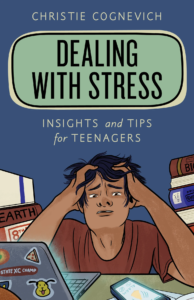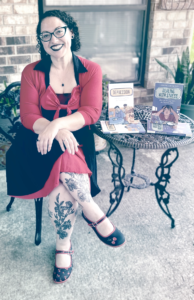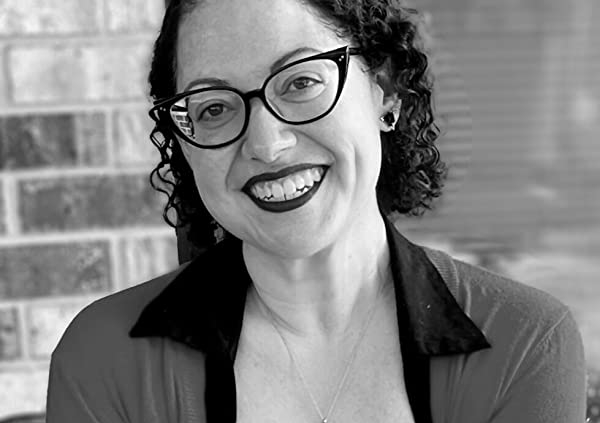Dealing With Stress: A Q&A With VCFA Alumnx Christie Cognevich
If there’s anything the past few years has taught us, it’s that stress is something that can no longer be pushed aside and ignored or accepted as simply part of being human. In her newest nonfiction book, Dealing With Stress, author, artist, mental health advocate, and VCFA alumnx Christi Cognevich tackles the topic of dealing with stress, tailoring the approach to help teenagers growing and changing in times that seem to always be unprecedented.

1. Tell us a little about this book. What was your goal in writing it?
Empowering readers through knowledge. “Knowledge is power” may sound like a cliche, but it is an enduring truism. Because stress responses are an essential gear in the much larger system of our bodies’ complex survival mechanisms, I wanted to demystify and destigmatize it. I wanted my readers to come away with more resources, identify with some of the anecdotes, and add some coping skills to their emotional toolbox.
I believe when we understand the function of something like stress, it’s much easier to not beat ourselves up for normal physiological and psychological responses. When we know why they’re happening, it becomes a little less difficult to roll with those stress responses instead of working against them. When we understand why we’re thinking and feeling the way we do, we can also recognize with a little more clarity when we’re overwhelmed or when we’re making ineffective or unhealthy choices for ourselves.
2. When did you notice the need for this book?
I wrote up the proposal for Dealing With Stress sometime in early 2021 when the enduring COVID-19 pandemic had made life very surreally confusing and difficult for many. Getting adequate mental health support is itself an ongoing international crisis, one that existed long before the pandemic. The pandemic just emphasized how, as a global community, we’re still a long way from where we need to be with accessible mental health resources.
At the time I was writing the book proposal, I was still teaching high school juniors and seniors full time. For many years I’ve worked very closely with adolescents who were stressing about their futures beyond high school—choosing whether college was right for them, deciding on professions, applying to colleges and scholarships, and so on. It’s a daunting task under the best of circumstances. Then the pandemic started. Thinking about their futures when the world had suddenly turned upside down was clearly nightmarishly stressful for so many of them. They were trying to figure out who they would be beyond adolescence in the middle of a storm of stressors, so it seemed really timely to be working on something that would provide the information and resources they needed.
3. What was something surprising you learned during the writing of this book?
The “amygdala hijack” is a concept I learned while working on Dealing With Stress that I think is fascinating and useful to know. It is, in fact, harder to think and make rational decisions when we’re under duress because the amygdala (the part of the brain that detects threats and triggers stress responses) works significantly faster than the frontal lobe (which controls conscious decision-making). Once the amygdala is in the driver’s seat, it begins issuing hormonal alarms that get our bodies ready to act, and it also prevents the frontal lobe from taking control.
That “hijack” serves a purpose. Our amygdalas need to function that quickly for our own survival. If we spend three seconds trying to consciously make a decision to jump aside when we’re about to get hit by a car, that’s not going to go well. Our amygdalas take over and send the signal to move out the way in a fraction of a second before we’ve even realized what’s happening. Of course, that’s an ideal situation where the amygdala hijack ensures our survival. Sometimes we’re stressed over things we can’t do anything about or things that aren’t true dangers. That’s when the “hijack” can be really problematic.
In one way, just knowing how and why our brains respond to stressors the way they do can help destigmatize our experiences. We might feel irrational in stressful situations because we really aren’t fully rational. There’s no shame in that. However, knowing the basics about how it works also gives us more options for later. It’s okay to realize that we’re not in a position to make effective choices or think clearly if we’re too stressed, so we need to step away to think.
And while we can’t necessarily take control of our amygdala responses in the moment, in calmer moments we can begin thinking through certain stressors where we’d prefer to stay calm (like, for example, taking tests). When we think them through outside the stressful moment, we can feel more prepared for when we encounter them later. By identifying and reviewing stressors in calming ways, we can, over time, help prevent our amygdalas from viewing those situations as a danger.
4. How did you choose the teens and adults who participated in the interview process?
I asked anyone and everyone who I thought might be willing to share their anecdotes! I’m quite grateful for the power of social media and friends/family being willing to share my interview requests with others! It was quite heartening and inspiring how many people are willing to share their really personal and even painful experiences with the hope that sharing their stories might help others.

5. What do you think is the most damaging effect of stress on teens and young adults?
Honestly, I think what’s deeply damaging isn’t from dealing with stress itself, it’s from how we hear people talking about it, which we then internalize ourselves. That can solidify views that promote ineffective or damaging coping mechanisms that carry on into adulthood. When we frame stress as “bad,” something to be avoided, something we can and should just “toughen up” about, that leads to deeply unhealthy, stigmatizing, and invalidating experiences when we experience stress. It’s easy to internalize that mindset: Why do I feel this way? What’s wrong with me? Am I just too weak, too sensitive? I should chin up. Other people had it worse. Just get over it. We will never avoid experiencing stress. Our bodies are designed to feel it. We wouldn’t survive without it. Invalidating ourselves only compounds the stress.
6. Did you do any research for this book during your time at VCFA?
I did! Dealing With Stress was researched and written during my second and third semesters in the WCYA program. My work on this book fueled significant inspiration for my critical thesis on highly sensitive protagonists. I’d spent so much time thinking about our neurological and psychological processes that it fed my interest in very internal characters and how we represent rich inner lives (as opposed to external action) on the page.
7. Your grad lecture was on highly sensitive protagonists. Can you explain what being highly sensitive means?
A small but significant portion of the population (about 20 percent) is what psychotherapist Elaine N. Aron terms “highly sensitive.” This isn’t a disorder but a neurological trait measured in four tendencies: depth of processing, overstimulation, emotional reactivity, and sensing subtleties. That is, highly sensitive people take in a lot of information about their environment and process it deeply, but can get overstimulated or stressed as a result of all that input. The upside about it is that even though highly sensitive people seem very “internal”—maybe seeming like they’re overly cautious and slow to act while they think through all the subtleties they’ve noticed—they act more intuitively and quicker in situations they recognize. They might overthink things and react slowly in an initial encounter, but if they can see the similarities between previous experiences and new ones, they have excellent intuition.
8. Does high stress affect highly sensitive young people differently than others?
In some ways, yes. They are more sensitive to their stressors because their nervous systems are wired for more stimulus: to notice more and be more reactive to it. But again, I’d say the biggest issue here is not the stress itself, but societal attitudes. Often, Western cultures deeply stigmatize sensitivity.
It’s not that highly sensitive young people aren’t wonderfully resilient and capable. It’s that they can regularly get mocked or invalidated for needing a break from a noisy room or wanting to avoid being in a big crowd. Needing a break or knowing their limits isn’t a weakness. When that experience gets labeled as a disorder or flaw, young people can internalize some pretty unhealthy (and, by extension, increasingly stressful) messages about themselves.
9. Tell us more about you! What are some cool things that people don’t know about you?
A lot of people know that I’m a huge book lover and cat enthusiast, but one of my biggest foundational passions (that I discuss rarely, for some reason) is for classic video games. I’m obsessed with the Dragon Warrior/Dragon Quest games which I’ve been playing and collecting for over thirty years. I still have my boxes, booklets, and maps for all my childhood Dragon Warrior games on the Nintendo. They’ve been made (and remade) across lots of game systems over the decades, so sometimes I have to dust off the old NES or PlayStation or Nintendo DS to play them. And yes, I’m really, really obsessed and do, in fact, buy new consoles solely based on DQ releases; I bought a Nintendo Switch because of it. I do play other games, but I buy new consoles just for that series. And I’m a big fan of some classic roleplaying adventure games on the PC, too.
It’s not just that I like to play them. I love thinking about the nuts and bolts of the game narrative, learning about the history of their making, and thinking about their technological/gameplay innovations. Watching the games evolve (while keeping much-loved familiar elements) is so much fun. Also, I spend a lot of time reading the Digital Antiquarian blog (filfre.net) about the history of computer games. I think that I love some of these games because it’s just a different kind of storytelling and narrative immersion.
10. Right now you’re working on a project that centers around growing up introverted and have invited our readers to be interviewed about their experiences as introverts. Can you tell us anything about that project?
Yes! Last month I signed the contract for my third YA non-fiction book tentatively titled Introverts: Insights and Tips for Teenagers. Some of it was, in fact, Inspired by the research I did for my critical thesis and graduate lecture on highly sensitive protagonists. Like my other YA non-fiction books, it will include anecdotes from interviews with teenagers and adults discussing their real-life experiences relayed directly in their own words. I welcome hearing from anyone in our wonderful community if you’re interested in doing an interview (either via email or Google Form) about their experiences growing up introverted. I can be contacted here via Google Form: https://forms.gle/
You can learn more about Christie and her books–and valuable, printable resources on dealing with stress and more–at her website, www.christiecognevich.com


